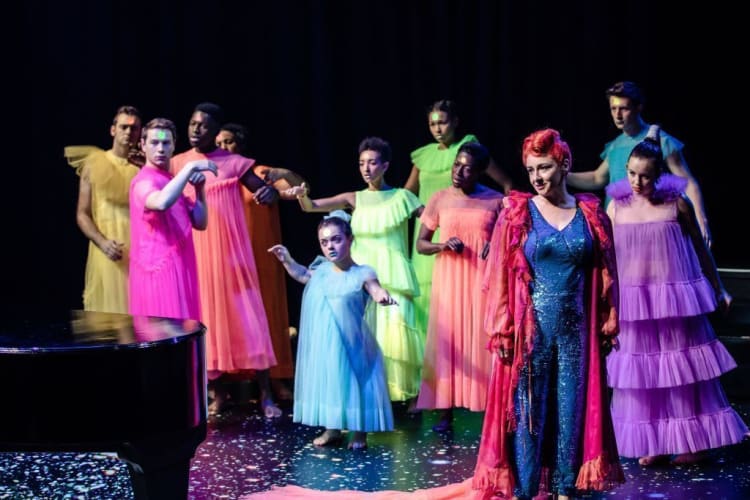Robert Hastie’s Dream is modern, magical and full of music. References to music are emphasised in the action and, as the Midsummer Night proceeds and the fairy world takes over, the tentative scales on a grand piano give way to whole passages of verse which are set to music and sung.
Initially, the fragments of scales are obtrusive and faintly irritating but once the convention is established it makes perfect sense, suggesting that the magical world of the fairies is never far away and, as the night darkens and the action moves to the enchanted wood, the music becomes increasingly dominant.
Shakespeare’s finest speeches are allowed to stand alone, like the First Fairy’s account early in the play of the upheaval in Nature caused by the quarrel between Oberon and Titania. We have the opportunity to listen attentively and appreciate the transcendent beauty of Shakespeare’s poetry, effectively delivered on this occasion by Rebecca Jayne-Davies.
The magical atmosphere is enhanced by stunning lighting and special effects. In one scene, the whole forest seems to dance and shimmer in a dusky light. The set is essentially a fairy ring surrounded by flowers and dominated by the grand piano which is used for live accompaniment and proves surprisingly adaptable in later scenes.
As is common practice now, Theseus and Hippolyta in the first scene become Oberon and Titania in the fairy scenes. Since Theseus is marrying the war-like Hippolyta after defeating her in battle, it is not surprising that there is some tension in the relationship which anticipates the more serious dispute between the fairy King and Queen. Phil Cheadle and Pandora Colin are strong and convincing in both roles and do justice to the verse.
But it is the comedy in the play that makes this such an entertaining and enjoyable production. Daniel Rigby is a perfect Bottom, vain, pompous, self-adulating, a master of the melodramatic pose. The company of mechanicals led by Sophia Nomvete as a harassed Peta Quince is a recognisably modern amdram group.
The scenes with the lovers are taken at a fast pace and are full of inventive comic action. All four are well characterised with Evelyn Miller an outstanding Helena who delivers long speeches with clarity and emotional range and Patricia Allison a particularly agile Hermia in well choreographed sequences of frantic action, ably supported by Toheeb Jimoh and Lorne MacFayden as the male lovers.
As the play progresses, the fairy scenes include more and more song and dance routines to music composed by Dan Gillespie Sells. These are increasingly hilarious and include a remarkable tap dance by the talented Francesca Mills. As Puck, Bobby Delaney is responsible for the confusion which dominates the action but also has the opportunity to be an amusing commentator on it.
By the concluding scene when the mechanicals’ play is performed before the Duke and his new bride, the production has definitely entered the realm of musical theatre. The mechanicals appear in their stage costumes which are delightfully inventive. Wall’s costume opens up a chink in a most unexpected place and Mills is a tamed but hilarious lion. Bottom’s death scene as Pyramus is one of the best I’ve ever seen. To die for!
This is an edited version of the play with some additional contemporary lines which add to the fun. It would be a delightful introduction to Shakespeare for young people unfamiliar with his work and particularly helpful to school students who may be studying the text. It is a hugely enjoyable experience and a credit to the actors and the whole production team.
